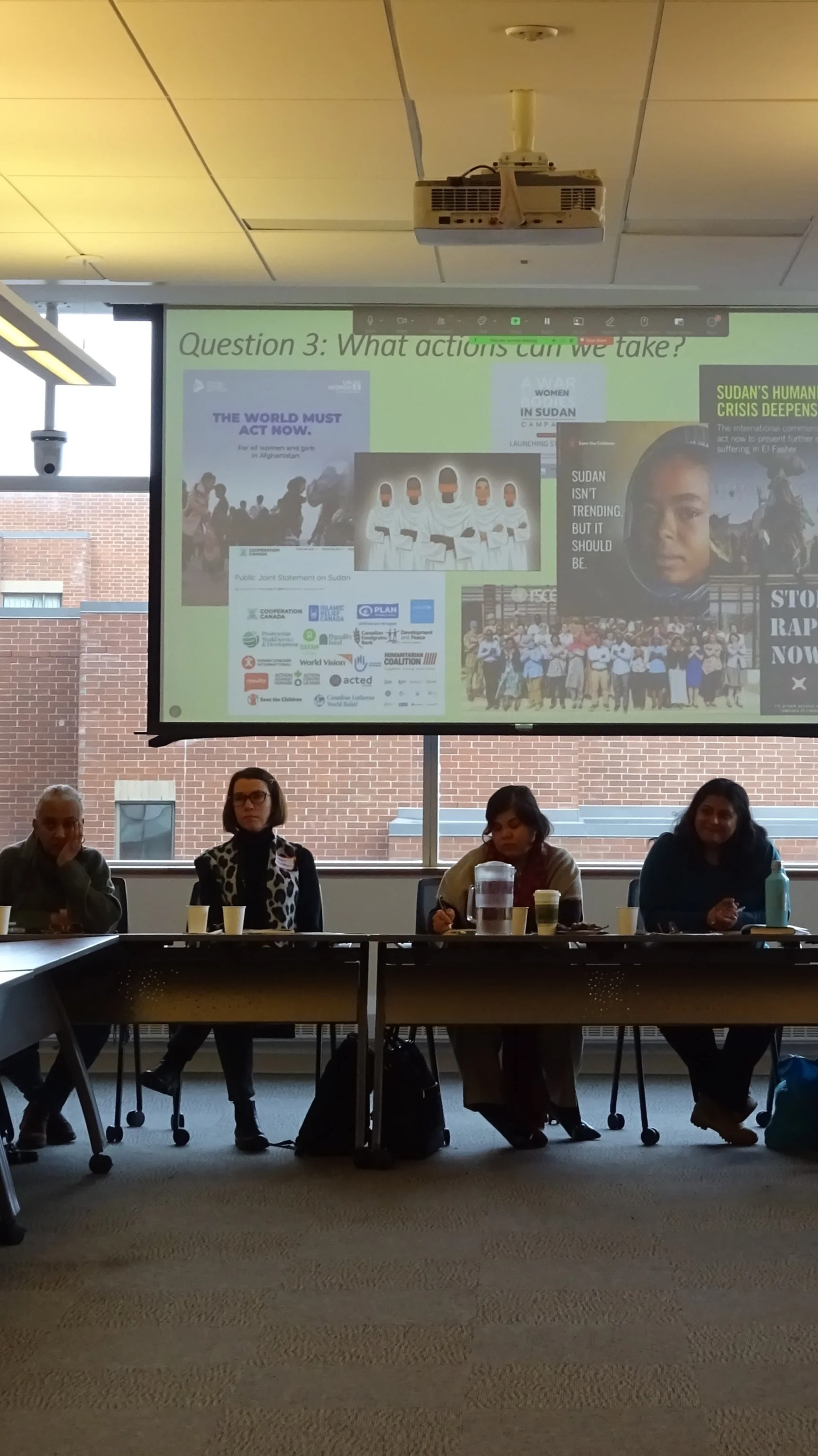
Project Reports
home / research / project reports
The Research Network on Women, Peace and Security conducts research on women, peace, and security in Canada and abroad. Find on this page research findings from its members and research leads related to its three strategic challenges.
DREAM Lab (Defence Resources, Exploring Alternatives to Militarism): 2025 Report
The 2025 DREAM Lab brings students together to critically examine Canada’s militarized spending and to reimagine how it might be redirected to better address the human security risks facing everyday Canadians. Through a week of training in policy analysis, conceptual work on security, field-based reflection, and data visualization, participants investigated the misalignment between current defence priorities and the lived realities of the climate emergency, gendered and racialized violence, healthcare breakdown, housing precarity, and the opioid crisis. Their findings show that even modest reallocations of militarized budgets could fund meaningful, life-saving programs, challenge dominant narratives about feasibility and expertise, and outline tangible alternatives for strengthening social wellbeing. This report synthesizes the students’ analyses and visual outputs, offering insight into the DREAM Lab’s process and presenting a model for evaluating public spending through a human security lens.
What We Heard | ‘Forgotten’ Crisis and Implications for Women, Peace and Security
This event took place at the University of Ottawa's Faculty of Social Science on November 14th. The event was organized by the Research Network on Women, Peace and Security (WPS), the Gender, Peace and Security Network in the Center for International Policy Studies (CIPS), the Canadian Civil Society Working Group on Sudan, and Inter Pares, with communications outreach from the Women, Peace and Security Network-Canada. The panellists emphasized that despite severe restrictions, conflict-related sexual violence, and shrinking humanitarian access, women and adolescent girls continue to act as first responders, economic drivers, and human rights defenders within their communities. The discussion highlighted the urgent need to center women's and girls' agency, strengthen feminist organizations, increase the use of language that "ignites moral obligation", and adjust how the WPS agenda responds to forgotten crises.
What We Heard | Confronting Backlash Symposium
The Research Network on Women, Peace and Security (RN-WPS), supported by the Mobilizing Insights in Defence and Security (MINDS) programme, and in collaboration with Dr. Colleen Bell at the University of Saskatchewan, co-hosted a symposium titled “Confronting Backlash and Barriers: From the Global to the Local” from June 18 to June 20, 2025. The event marked the second annual symposium of the RN-WPS and brought together a diverse group of participants to explore critical challenges within the Women, Peace and Security (WPS) agenda, while addressing the ongoing crisis of Missing and Murdered Indigenous Women, Girls, and Two-Spirit People (MMIWG2S). Proceedings opened with a welcome and Land Acknowledgement on Treaty Six territory—home to the Cree and Métis peoples, as well as other nations who share this land—anchoring the dialogue in the lived realities of Indigenous communities and situating it within a broader global security context.
What We Heard | Canada’s Feminist International Assistance Policy After Eight Years
Introduced two years after the election of the first Trudeau Liberal government in 2015, FIAP signaled a new direction for Canada’s International policy. For many within the civil society sector, this shift represented a positive departure from the Harper Conservative government, during which development partnerships were constrained: civil-society organizations were defunded for advocating reproductive rights, discussions of contraception were banned, and Global Affairs Canada’s partnership branch was dismantled. FIAP altered this trajectory. The FIAP placed gender equality and the empowerment of women at the core of Canada’s international assistance. After eight years of programming, partnerships and debate, the event brought together scholars, development practitioners, and civil society representatives to reflect on the lessons learned from FIAP’S roll-out and to identify future priorities.
On September 29, 2025, during a panel discussion at the University of Ottawa, the panelists were asked to reflect on the impact of the FIAP over the past eight years.
What We Heard | Strengthening the Representation of Women in Diplomacy: Challenges and Policy Solutions
The Centre for International Policy Studies (CIPS); the Gender Peace Development Research Network; and the Research Network on Women Peace and Security collaborated to host a roundtable discussion on September 11, 2025 that explored issues surrounding the representation of women in diplomacy. This event focused on identifying both barriers and enablers to women’s leadership in national diplomatic services and international organizations. Written by Ayewa Donkoh and Loretta Baidoo.
Final Report | Feminism in the Face of Failure: Writing the Next Chapter
In August 2023, the organizers hosted a three-day workshop at the National Autonomous University of Mexico (UNAM) in Mexico City. The central research question guiding the conference was: What happens when women, who emerged as leaders during and/or following armed conflict, are faced with the return of conflict, rising repression, or growing authoritarianism?
What We Heard | Youth Protesters, Gender Equality, and Political Transitions: Insights from Bangladesh
On March 14, 2025, a panel was convened to discuss the ongoing youth protests, gender inequality, and political transition in Bangladesh. The panel was sponsored by the Centre for International Policy Studies (CIPS), the Gender, Peace, and Development Research Network (GPD-RN), and the Research Network on Women, Peace, and Security (RN-WPS). Scholars, practitioners and professionals came together to discuss the protests that took place in Bangladesh in the summer of 2024. Themes of women's rights, gender equity, and the current political atmosphere of Bangladesh were examined by the participants on the panel.
What We Heard | Pedagogies for Peace Symposium
On February 5, 2025, the second iteration of the Research Network on Women, Peace and Security (RN-WPS) kicked off its first annual symposium since receiving a renewed round of support from the Mobilizing Insights in Defence and Security (MINDS) program. Organized by Drs. Miriam Anderson, Vanessa Brown and Allison Petrozziello as a joint event between the Canadian Forces College (CFC) and Toronto Metropolitan University (TMU), the symposium created an intersectoral space where academic researchers, members of the security sector, and representatives from civil society organizations could come together and share pedagogical successes and failures that arise when teaching Women, Peace and Security (WPS) across a variety of contexts.
What We Heard | No Women, No Peace? Gender and Multilateral Security Governance
The project explains why the WPS agenda was adopted in different regional settings and how this has impacted security dynamics in Africa, Southeast Asia, North America and Europe. It compares the African Union, ASEAN and NATO, as three international organizations that have interpreted WPS with three distinct, though overlapping, logics. The project rests on hundreds of interviews (ongoing) and the analysis of thousands of scholarly and policy materials, which provide thorough content analysis to make sense of the narratives and practices that shape contemporary understandings of WPS and security practices across these three regions. (Written by Ayewa Donkoh, UOttawa)
DREAM Lab (Defence Resources, Exploring Alternatives to Militarism): 2023 Report
The DREAM lab was a product of Dr. Megan MacKenzie’s vision to support students in reimagining alternative ways that defence funds could be spent and allocated. The aim of the lab is to adopt a critical lens in considering what current defence spending protects against and compare this to how funds might be used differently to address pressing human security threats. The purpose of the inquiry was to demystify and make defence budgets more tangible by treating these funds as zero-sum, comparing losses against other social and public spending, demonstrating the types of projects which could be funded by cutting traditional military spending.
Revisiting the impact of Cybersecurity, COVID-19, and Conflict Nexus on Women Human Rights Defenders
In this report, Hafsa Afailal and Muzna Dureid examine the impact of the COVID-19 pandemic on the progress and commitment of Women Human Rights Defenders, Activists, and Peacebuilders and assess the effectiveness of its coordination and coping mechanisms. The study takes a holistic approach, examining the interplay between Cybersecurity, COVID-19, and Conflict (triple C) Nexus. The goal is to enhance women's meaningful participation in conflict prevention, resolution, and peacebuilding.
Where is the Peace in WPS? Addressing demilitarization as a key priority
Militarization is a barrier to meaningful peace and security in Canada and around the world. The purpose of this paper is to highlight existing government policy relationships to militarization, to demonstrate how this impedes efforts to bolster global peace and security, and to present alternative options for the future. Pursuing demilitarization is necessary for upholding Canada’s commitment to Women, Peace, and Security (WPS) priorities, and should be prioritized in future Canadian National Action Plans (NAP). We hope that this will inform future policy development across relevant portfolios, including National Defence, Status of Women, Global Affairs, Public Safety, and International Trade.
This report was generated by members of the Women, Peace, & Security Research Network. Created through a working group of experts, dialogue was initiated around what demilitarization means in the context of the WPS Agenda priorities in Canada. Contributors included academics, government officials, activists, and nongovernmental organization representatives.












